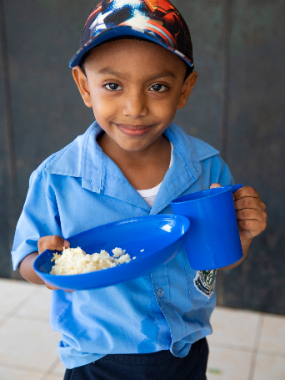“Hungry children need food,” said Elder Gerrit W. Gong, an Apostle of The Church of Jesus Christ of Latter-day Saints, in January 2021. “With one humanitarian partner, we are delivering 30 million meals to school children in nine developing countries. Each meal plate includes 482 life-sustaining calories of grains, protein, vegetables and fruits.”
That partner is Convoy of Hope, a faith-based nonprofit that provides food, supplies and humanitarian aid to impoverished populations worldwide. Latter-day Saint Charities is helping fund its school feeding programs.
“Our program method ensures the food being distributed is used in a responsible and strategic way that invests in the lives of those eating and does not create dependency or hurt local markets,” said Convoy of Hope Procurement Director Paul Holzer.
Although Convoy of Hope’s traditional school feeding supply chain has felt the tremors of the pandemic, the organization has remained resilient.
| Temple Square is always beautiful in the springtime. Gardeners work to prepare the ground for General Conference. © 2012 Intellectual Reserve, Inc. All rights reserved. | 1 / 2 |
“Because of the relationships with the schools we serve, the Convoy of Hope teams in the field have been successful in maintaining the flow of critical food to students through take-home rations,” Holzer said.
Another critical partner in the process is Feed My Starving Children (FMSC), an organization that provides the meals that Convoy of Hope distributes.
FMSC develops nutrition-based food assistance for the developing world. Its team of food scientists from Cargill, Pillsbury and General Mills developed their original fortified rice formula, the MannaPack™, in the early 1990s. It is a simple, stable, cross-cultural food full of protein and micronutrients for children at risk of malnourishment. MannaPack™ is used in 70 countries by schools, orphanages, clinics and feeding programs in vulnerable, food-insecure areas.
With the help of noted dietician Cade Fields-Gardner, FMSC developed two new formulas: MannaPack™ Potato-D, which stabilizes symptoms of diarrhea (a leading killer of young children), and MannaPack™ Potato-W, a complementary food that helps wean infants seven to 12 months old.

“It has been extremely gratifying to work with Feed My Starving Children because they have been very progressive—ahead of the wave—in developing products for specific populations, needs and objectives,” Fields-Gardner said. “Their formulas to manage diarrhea and use after the exclusive breastfeeding period answer needs that were unmet until now. FMSC has developed exactly what was needed and recommended: food products to achieve very specific nutritional and health results.”
The Church recognizes that these 30 million meals only address a fraction of the need. The United Nations predicted in July 2020 that COVID disruptions could push an additional 130 million people into chronic hunger.
“While only a start, our humanitarian contributions are ongoing, needed and welcomed in vulnerable areas such as Somalia, Yemen, DR Congo, Haiti, and Zimbabwe, and in conflict regions in Syria, Yemen, South Sudan, DR Congo and Africa’s Sahel region, among others,” Elder Gong said.
Latter-day Saint Charities will continue to work with its humanitarian partners to provide critical help and access to nutritious food for vulnerable children.